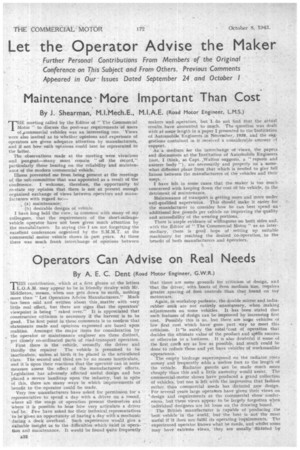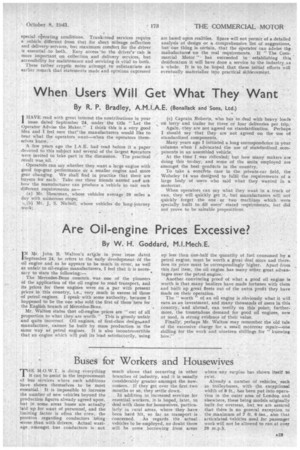Operators Can Advise on Real Needs
Page 24

Page 25

If you've noticed an error in this article please click here to report it so we can fix it.
By A. E. C. Dent (Road Motor Engineer. G.W.R.) THIS contribution, which at a first glance at the letters L.O.A.M. may appear to be in friendly rivalry with Mr. Middleton, means, when one gets down to earth, nothing snore than "Let Operators Advise Manufacturers." Much has been said and written about this ,matter with very little real effect, but there are signs that the operators' viewpoint is being " raked over," It is appreciated that constructive criticism is necessary if the harvest is to be good. The first point in these comments is to confirm that statements made and opinions expressed are based upon realities. Amongst the major items for consideration by the operator or maintenance engineer are three distinct, yet closely co-ordinated parts of road-transport operation.
First there is the vehicle, secondly the driver and thirdly the repairer The vehicle is presumed to be inarticulate, unless at birth it be placed in the articulated class. The second and third are by no means inarticulate, and it is upon their reactions that the operator can in some measure assess the effect of the manufacturers' efforts. Legislation has adversely affected useful design and has placed a severe handicap upon the industry, but in spite of this, there are many ways in which improvements of benefit to the operator could be made.
Very few manufacturers have asked for permission for a representative to spend a day with a driver on a round, where all the snags ot operation present themselves and Where it is possible to hear how very articulate a driver • can' be. Few have asked for their technical representatives to be giVen an opportunity of having a day with a mechanic during a dock overhaul. Such experiences would give a valuable insight as to the difficulties which exist' in operatiOn and maintenance. It would be found quite frequently
that there are some grounds for criticism of design, and that the driver, with '''boots of_tiven medium 'size, requires greater .spacing of foot controls than that found on toy motorcars.
Again, in workshop parlance, the double mirror and iudiarubber neck are not entirely unnecessary, when making adjustments on 'some vehicles. It has been stated that such features of design can be improved by increasing first cost. Possibly this is so, but there are some vehicles of low first . cost which have gone part way to meet this criticism. It surely the total i'cost of operation that decides the ultimate value of the product and sPells success or otherwise to a business. It is also doubtful if some of the first cost are as low as possible, and much could be done to reduce these and yet have vehicles of workmanlike appearance.
The empty birdcage superimposed on the radiator costs money and frequently adds a useless foot to the length of the vehicle. Radiator guards can be made much more cheaply than this and a little austerity would assist. The commercial-motor shows have produced a grand collection of vehicles, but one is left with the impression that fashion rather than commercial needs has dictated neyv design. For several years large operators have given their views on 'design and requirements at the commercial show conferences, but these views appear to be largely forgotten when individual designers are let loose on the drawing board.
The British manufacturer is capable of producing the best vehicle in theworld, but the best is not the most useful if it does not fulfil its operating requirements. The experienced operator knows what he needs, and whilst some may have extreme views, they are usually' dictated • by special oPerating conditions. Trunk-road services require a vehicle different from, that for short mileage collection and delivery, services, but maximum comfort for the driver is essential to both. Easy access 'tothe driver'scab is more important. on collection and delivery services, but accessibility for maintenance and servicing is vital to both.
These rather cryptic notes attempt to substantiate an earlier remark that statements made and opinions expressed are based upon realities. Space will not permit of a detailed analysis of design or a comprehensive list of suggestions, but one thing is certain, that the operator can advise the manufacturei on the real requirements. If " The Commercial Motor" ha S succeeded in establishing this desideratum it will have done a service to the industry as a whole. It is to be hoped that these initial efforts will eventually materialize into practical achievement.




















































